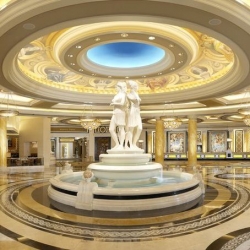
Carl Icahn previously has owned Tropicana Entertainment, Trump Taj Mahal, Fontainebleau Resort, and Stratosphere Las Vegas.
Carl Icahn is building a position in Caesars Entertainment, which caused Caesars shares to rise on the new. CZN stocks rose 7.88% in early trading, increased to over 8% when news confirmed that Carl Icahn was buying in, and ended up 5.8% on the day.
After the story broke that Mr. Icahn was buying Caesars Entertainment shares, CNBC reported that Golden Nugget owner Tilman Fertitta remains interested in merging his company with Caesars. Despite a troublesome year and the impending departure of its CEO, Caesars continues to be a favorite target of top industry executives.
Carl Icahn has gained a wealth of experience in the casino industry over the past 10 years. He bought a controlling share in Tropicana Resorts & Entertainment in 2010, when that company faced bankruptcy due to the Global Recession.
Over the next 5 years, Icahn turned Tropicana Atlantic City around, so it was making a profit by 2015. He sold Tropicana Entertainment to Eldorado Resorts and Gaming & Leisure Properties in early 2018 for $1.8 billion.
Carl Icahn and Fontainebleau
Also in 2010, Carl Icahn bought the unfinished Fontainebleau resort in Las Vegas for $150 million. He sat on the property for seven years, realizing its value would increase when the US economy recovered.
In 2017, he sold Fontainebleau for $600 to Witkoff Group, New Valley LLC, and Marriott International — which renamed the property The Drew Las Vegas. In only seven years, Icahn had quadrupled his investment on the Fontainebleau project.
Icahn’s Stratosphere Investment
In 1997, Carl Icahn bought the Las Vegas Stratosphere after the Stratosphere Corporation went bankrupt. Stratosphere was the brainchild of Bob Stupak, but after the ambitious tower opened in 1996, it faced financial difficulties.
Icahn kept the property for ten years, then sold it to Goldman Sachs’ Whitehall Street Real Estate Fund in 2007 for $1.3 billion. Forbes described the Stratosphere as Carl Icahn’s best investment in the casino business.
The Trump Taj Mahal Controversies
Of course, the activist investor has had his setbacks. He was the largest shareholder in the Trump Taj Mahal when it faced bankruptcy in late 2014. He rescued the property with a loan in December 2014, then bought the company outright in 2015.
Over the next 18 months, Carl Icahn faced labor strife as he negotiated a collective bargaining agreement with the Local 54 of UNITE-Here union. The Trump Entertainment owner faced repeated pickets and protests that culminated in a strike on the Fourth of July weekend of 2016.
After a three-week strike, Icahn announced he would close the casino in October 2016. Meanwhile, he quarrelled publicly with Local 54 president Bob McDevitt, as well as New Jersey State Senate President Stephen Sweeney.
When the State Senate passed a bill that would strip Carl Icahn of his gaming license if he reopened the casino with non-union workers, the legendary investor said he would sell the Trump Taj Mahal. Gov. Chris Christie vetoed Sweeney’s bill, but Carl Icahn sold Trump Taj Mahal in February 2017 to Hard Rock International. He claimed he lost $200 million to $300 million on the investment.
Carl Icahn: Corporate Raider or Activist Investor?
If that’s the case, it is a rare loss for Carl Icahn. Since the 1960s, he has been considered one of the smartest investors in the stock market. In the 80s, Icahn was one of the new class of investors called corporate raiders. By the 2000s, those same people often were called “activist investors“, because they would buy enough shares of a corporation to influence executive decisions, then guide the corporation to a new era of efficiency and profitability.
That would appear to be Carl Icahn’s plan with Caesars Entertainment, though potential investors should be warned that it is not known the level of investment Carl Icahn has made. Caesars Entertainment would appear to be the classic case of a company Icahn might target. It owns more casino US properties than any other group in the United States, but has been dogged by debt from a leveraged buyout in 2007. One of its divisions underwent bankruptcy and reorganization as recently as 2015-2016.
Caesars’ Hopes for Japanese Casino
Caesars Entertainment has big ambitions for the Japanese casino market, but faces stiff competition from fellow American giants like MGM Resorts and Las Vegas Sands Corp, along with Chinese casino giants Galaxy Entertainment Group and Melco Resorts & Entertainment.
Carl Icahn’s presence could not hurt Caesars in the Japanese market. Las Vegas Sands’ Sheldon Adelson would seem to have an advantage in securing a Japanese casino license, because LVS is the most lucrative casino company in the world, has a prestigious reputation in Asia, and has a CEO who is personal friends with President Donald Trump.
Carl Icahn & Donald Trump
The new investor in Caesars Entertainment is also personal friends with Donald Trump. When Icahn secured control of Trump Entertainment in 2016, both Donald Trump and Ivanka Trump made public statements calling him a friend and giving their well wishes. When Donald Trump became US president, he appointed Carl Icahn as his special advisor on regulatory reforms.
That appointment ended when Trump’s opponents claimed Icahn had a conflict of interest involving the regulations being slashed, but the friendship continues to this day. Eased out of the White House mileau at the same time Steve Bannon was fired and Gen. John Kelly was hired, few seemed to notice Carl Icahn leaving active politics.
Now it appears Icahn has re-entered the casino industry. If so, in and around Caesars Entertainment is likely to get more interesting.
